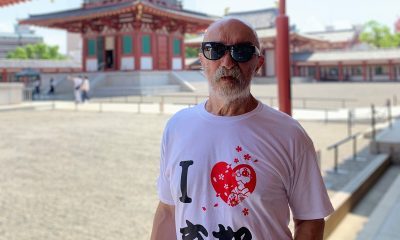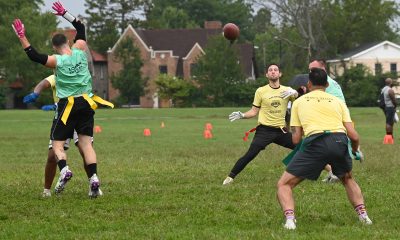National
New Cleveland group picked for 2014 Gay Games
Chances decrease for moving Olympic-esque event to D.C.

Organizers of the Gay Games this week reconfirmed their decision to keep the international LGBT athletic event in Cleveland in 2014 by naming a new Cleveland-based organization to operate the games.
The development raises further doubts about whether the 2014 games could be moved to D.C., which submitted a bid for the event through an LGBT sports coalition.
The Federation of Gay Games announced Monday that it has awarded Cleveland Special Events Group Corp., a non-profit entity, an exclusive license to host and run the 2014 games in the Cleveland-Akron area. The new group consists of LGBT and non-LGBT organizations and individuals from the Cleveland area.
The action comes less than two months after the Cleveland Synergy Foundation filed a lawsuit against the FGG, charging it with breach of contract and defamation for ousting Synergy as the operator of the 2014 Gay Games. FGG officials said they terminated the license agreement they awarded Synergy Foundation in 2009 because Synergy failed to meet its obligations under the agreement.
In its lawsuit, Synergy disputes that claim, saying it was the FGG that violated the terms of the license.
An attorney for Synergy told the Blade Tuesday that Synergy officials expect the court overseeing the lawsuit to declare the new licensing agreement with Cleveland Special Events Group “null and void” and to force the FGG to return the license to Synergy.
“We believe that the evidence will clearly show that they…are in breach of the license agreement with us and that they have no authority to award the license to another entity,” said Synergy attorney Richard Haber.
According to Haber, FGG’s bidding rules, which he said were part of the agreement with Synergy, prevent the FGG from awarding the license to an entity other than the ones who submitted bids for the games last year. Cleveland Synergy was the only Cleveland area group to submit a bid.
Organizations representing LGBT sporting groups in Washington and Boston submitted competing bids but were passed over in favor of Cleveland Synergy in October 2009, when the FGG first announced the 2014 games would be held in Cleveland.
The D.C. group, Metropolitan Washington Gaymes, Inc. was named the runner up bidder by the FGG, placing D.C. as the city that should host the games if the Cleveland hosting group was unable to fulfill its licensing agreement. Officials with the D.C. group have said they, too, believe FGG rules prevent FGG from awarding the license to another group in Cleveland that did not submit an original bid for the games in 2009.
Haber said Cleveland Synergy will ask the court to expedite court action on his client’s lawsuit against the FGG. FGG and other parties named as defendants in the lawsuit, including the City of Cleveland, must file their response to the lawsuit by Nov. 12 under a deadline set by the judge in the case. The judge scheduled a pre-trial hearing for Nov. 15.
In a Saturday statement announcing the selection of the new Cleveland group to operate the games, FGG officials made no mention of the pending lawsuit.
“The new organization represents the LGBT community and high quality civic leaders of Cleveland,” the statement says. “The City of Cleveland will continue to be very involved in assisting the world’s largest sports and cultural event to come to Cleveland-Akron, Ohio.”
Cleveland Mayor Frank Jackson, who has pledged to provide city financing for the games, issued his own statement praising the FGG’s decision to keep the games in Cleveland.
“The Gay Games in 2014 will shine a national and international spotlight on the City of Cleveland,” he said. “Our representatives either lead or are a part of some of Cleveland’s and the region’s most dynamic institutions and will help show the world our greatness.”
At the time it ousted Cleveland Synergy from its role as operator of the games, sources familiar with the FGG said FGG officials would consider moving the event to D.C. or Boston if Cleveland failed to put together a qualified new LGBT oriented entity to operate the games in Cleveland by Dec. 15. LGBT sports ethusiasts in D.C. were hopeful that D.C. would be selected to host the games in its status as the runner up city. But this week’s action by the FGG makes a change in location unlikely unless the court rules against the FGG and Synergy Foundation is deemed unable to host the games.
Some observers say the court case could drag on for a year or more, making it difficult for D.C.’s group to make arrangements to host the Gay Games even if the FGG eventually offers it the license.
U.S. Supreme Court
Supreme Court to consider bans on trans athletes in school sports
27 states have passed laws limiting participation in athletics programs

The U.S. Supreme Court on Thursday agreed to hear two cases involving transgender youth challenging bans prohibiting them from participating in school sports.
In Little v. Hecox, plaintiffs represented by the ACLU, Legal Voice, and the law firm Cooley are challenging Idaho’s 2020 ban, which requires sex testing to adjudicate questions of an athlete’s eligibility.
The 9th U.S. Circuit Court of Appeals described the process in a 2023 decision halting the policy’s enforcement pending an outcome in the litigation. The “sex dispute verification process, whereby any individual can ‘dispute’ the sex of any female student athlete in the state of Idaho,” the court wrote, would “require her to undergo intrusive medical procedures to verify her sex, including gynecological exams.”
In West Virginia v. B.P.J., Lambda Legal, the ACLU, the ACLU of West Virginia, and Cooley are representing a trans middle school student challenging the Mountain State’s 2021 ban on trans athletes.
The plaintiff was participating in cross country when the law was passed, taking puberty blockers that would have significantly reduced the chances that she could have a physiological advantage over cisgender peers.
“Like any other educational program, school athletic programs should be accessible for everyone regardless of their sex or transgender status,” said Joshua Block, senior counsel for the ACLU’s LGBTQ and HIV Project. “Trans kids play sports for the same reasons their peers do — to learn perseverance, dedication, teamwork, and to simply have fun with their friends,” Block said.
He added, “Categorically excluding kids from school sports just because they are transgender will only make our schools less safe and more hurtful places for all youth. We believe the lower courts were right to block these discriminatory laws, and we will continue to defend the freedom of all kids to play.”
“Our client just wants to play sports with her friends and peers,” said Lambda Legal Senior Counsel Tara Borelli. “Everyone understands the value of participating in team athletics, for fitness, leadership, socialization, and myriad other benefits.”
Borelli continued, “The U.S. Court of Appeals for the Fourth Circuit last April issued a thoughtful and thorough ruling allowing B.P.J. to continue participating in track events. That well-reasoned decision should stand the test of time, and we stand ready to defend it.”
Shortly after taking control of both legislative chambers, Republican members of Congress tried — unsuccessfully — to pass a national ban like those now enforced in 27 states since 2020.
Federal Government
UPenn erases Lia Thomas’s records as part of settlement with White House
University agreed to ban trans women from women’s sports teams

In a settlement with the Trump-Vance administration announced on Tuesday, the University of Pennsylvania will ban transgender athletes from competing and erase swimming records set by transgender former student Lia Thomas.
The U.S. Department of Education’s Office for Civil Rights found the university in violation of Title IX, the federal rights law barring sex based discrimination in educational institutions, by “permitting males to compete in women’s intercollegiate athletics and to occupy women-only intimate facilities.”
The statement issued by University of Pennsylvania President J. Larry Jameson highlighted how the law’s interpretation was changed substantially under President Donald Trump’s second term.
“The Department of Education OCR investigated the participation of one transgender athlete on the women’s swimming team three years ago, during the 2021-2022 swim season,” he wrote. “At that time, Penn was in compliance with NCAA eligibility rules and Title IX as then interpreted.”
Jameson continued, “Penn has always followed — and continues to follow — Title IX and the applicable policy of the NCAA regarding transgender athletes. NCAA eligibility rules changed in February 2025 with Executive Orders 14168 and 14201 and Penn will continue to adhere to these new rules.”
Writing that “we acknowledge that some student-athletes were disadvantaged by these rules” in place while Thomas was allowed to compete, the university president added, “We recognize this and will apologize to those who experienced a competitive disadvantage or experienced anxiety because of the policies in effect at the time.”
“Today’s resolution agreement with UPenn is yet another example of the Trump effect in action,” Education Secretary Linda McMahon said in a statement. “Thanks to the leadership of President Trump, UPenn has agreed both to apologize for its past Title IX violations and to ensure that women’s sports are protected at the university for future generations of female athletes.”
Under former President Joe Biden, the department’s Office of Civil Rights sought to protect against anti-LGBTQ discrimination in education, bringing investigations and enforcement actions in cases where school officials might, for example, require trans students to use restrooms and facilities consistent with their birth sex or fail to respond to peer harassment over their gender identity.
Much of the legal reasoning behind the Biden-Harris administration’s positions extended from the 2020 U.S. Supreme Court case Bostock v. Clayton County, which found that sex-based discrimination includes that which is based on sexual orientation or gender identity under Title VII rules covering employment practices.
The Trump-Vance administration last week put the state of California on notice that its trans athlete policies were, or once were, in violation of Title IX, which comes amid the ongoing battle with Maine over the same issue.
New York
Two teens shot steps from Stonewall Inn after NYC Pride parade
One of the victims remains in critical condition

On Sunday night, following the annual NYC Pride March, two girls were shot in Sheridan Square, feet away from the historic Stonewall Inn.
According to an NYPD report, the two girls, aged 16 and 17, were shot around 10:15 p.m. as Pride festivities began to wind down. The 16-year-old was struck in the head and, according to police sources, is said to be in critical condition, while the 17-year-old was said to be in stable condition.
The Washington Blade confirmed with the NYPD the details from the police reports and learned no arrests had been made as of noon Monday.
The shooting took place in the Greenwich Village neighborhood of Manhattan, mere feet away from the most famous gay bar in the city — if not the world — the Stonewall Inn. Earlier that day, hundreds of thousands of people marched down Christopher Street to celebrate 55 years of LGBTQ people standing up for their rights.
In June 1969, after police raided the Stonewall Inn, members of the LGBTQ community pushed back, sparking what became known as the Stonewall riots. Over the course of two days, LGBTQ New Yorkers protested the discriminatory policing of queer spaces across the city and mobilized to speak out — and throw bottles if need be — at officers attempting to suppress their existence.
The following year, LGBTQ people returned to the Stonewall Inn and marched through the same streets where queer New Yorkers had been arrested, marking the first “Gay Pride March” in history and declaring that LGBTQ people were not going anywhere.
New York State Assemblywoman Deborah Glick, whose district includes Greenwich Village, took to social media to comment on the shooting.
“After decades of peaceful Pride celebrations — this year gun fire and two people shot near the Stonewall Inn is a reminder that gun violence is everywhere,” the lesbian lawmaker said on X. “Guns are a problem despite the NRA BS.”
-

 U.S. Supreme Court3 days ago
U.S. Supreme Court3 days agoSupreme Court to consider bans on trans athletes in school sports
-

 Out & About4 days ago
Out & About4 days agoCelebrate the Fourth of July the gay way!
-

 Virginia4 days ago
Virginia4 days agoVa. court allows conversion therapy despite law banning it
-

 Opinions4 days ago
Opinions4 days agoCan we still celebrate Fourth of July this year?












